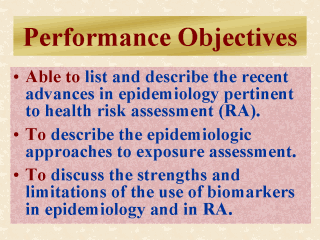| front |1 |2 |3 |4 |5 |6 |7 |8 |9 |10 |11 |12 |13 |14 |15 |16 |17 |18 |19 |20 |21 |22 |23 |review |
 |
At the end of
this lecture, students should be able to characterize briefly the recent advances in
epidemiology that are pertinent to health risk assessment (RA). Recent epidemiologic
advances relevant to RA include the branching of epidemiology into several well-recognized
specialty disciplines, such as pyschosocial epidemiology, occupational epidemiology,
environmental epidemiology, nutritional epidemiology, pharmaco-epidemiology, genetic
epidemiology, molecular epidemiology, and cancer epidemiology. These specialties involve special study designs and specific information for epidemiologic investigations. The human exposures and risk factors in these specific studies hence require some special tools for assessment or measurement. From this lecture, students should be able to identify the recent advances in these areas. Finally, students should also be able to outline the strengths and limitations of the use of biomarkers in epidemiologic investigations. The biomarkers available for exposure assessment or for risk factor measurement often vary from one epidemiologic specialty to another. However, it is important to note that their general use in epidemiologic investigations (and hence in RA as well) remains the same. |